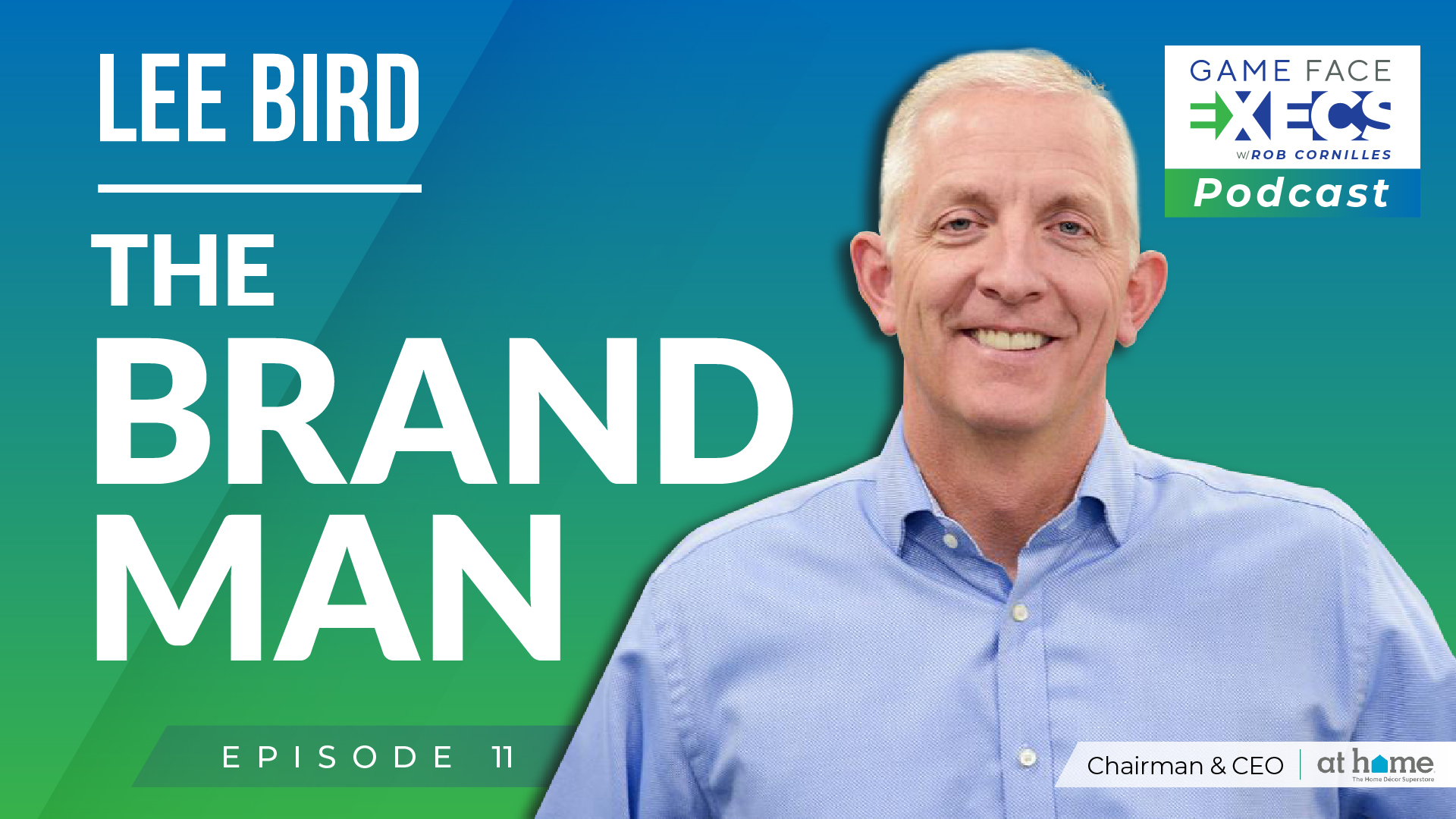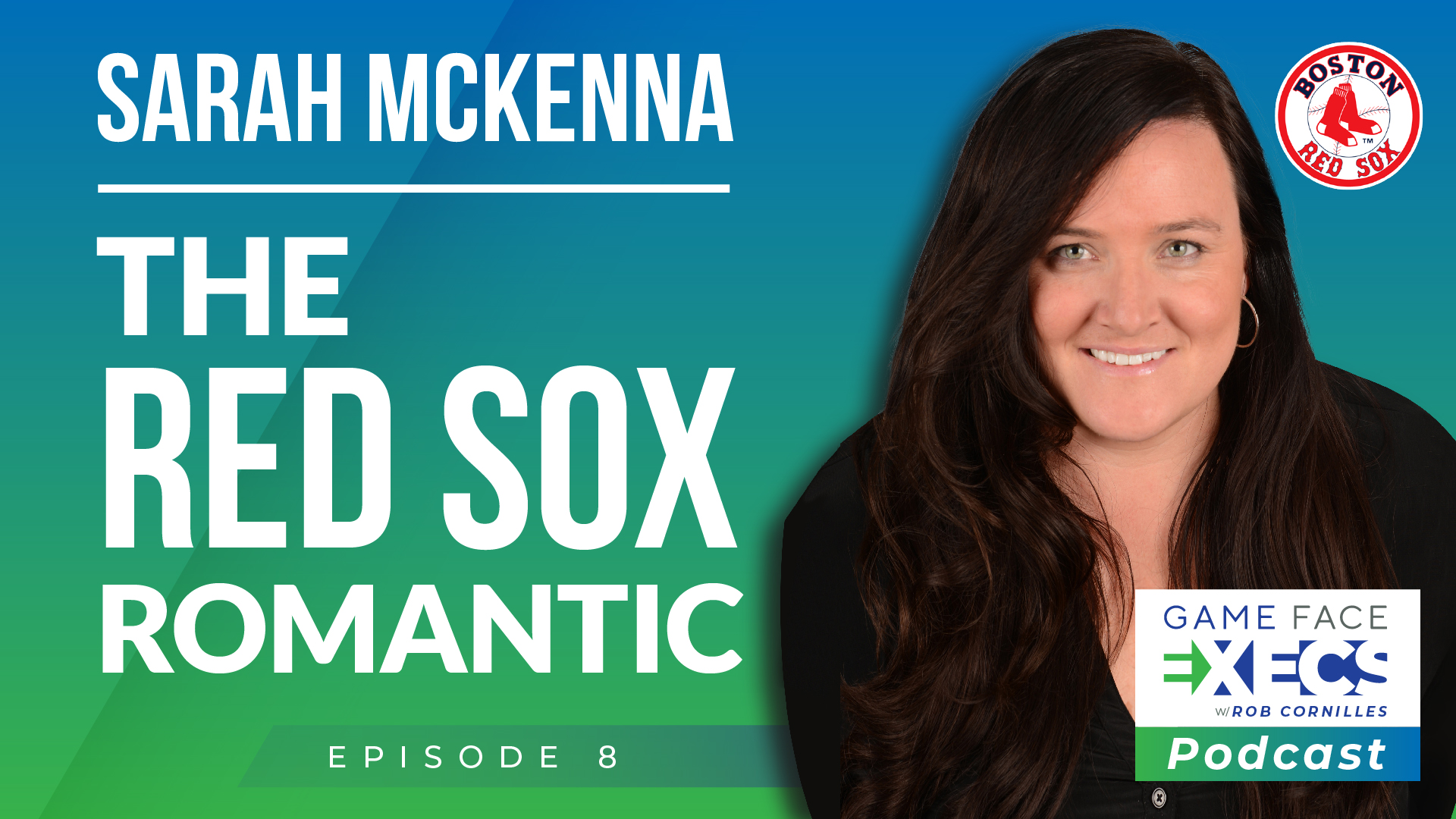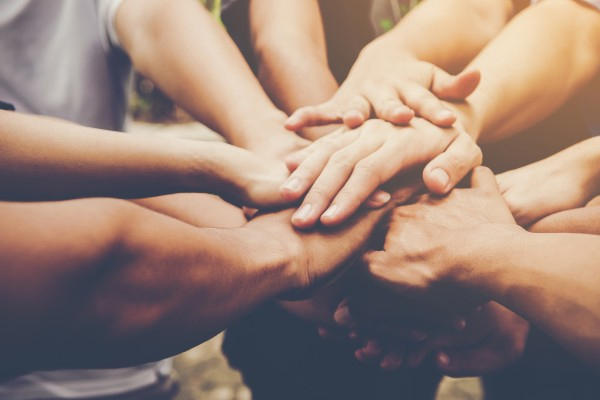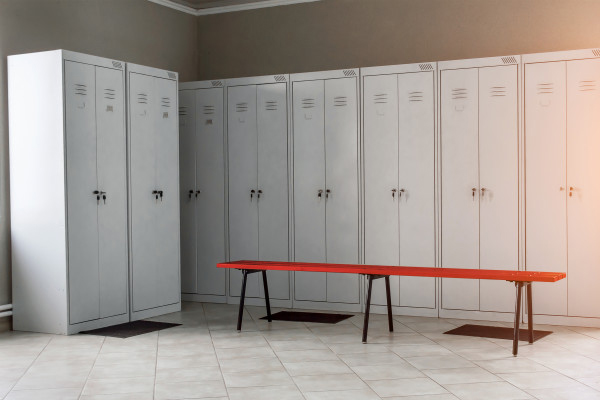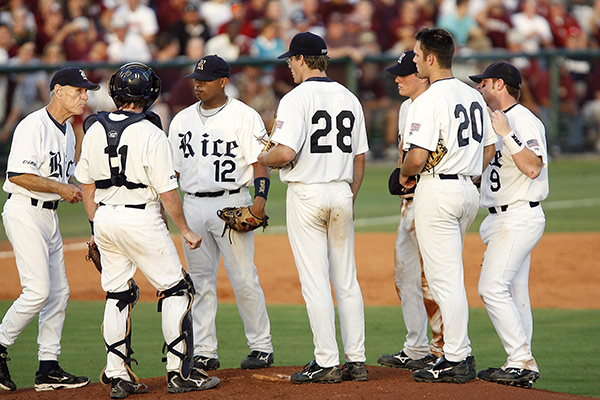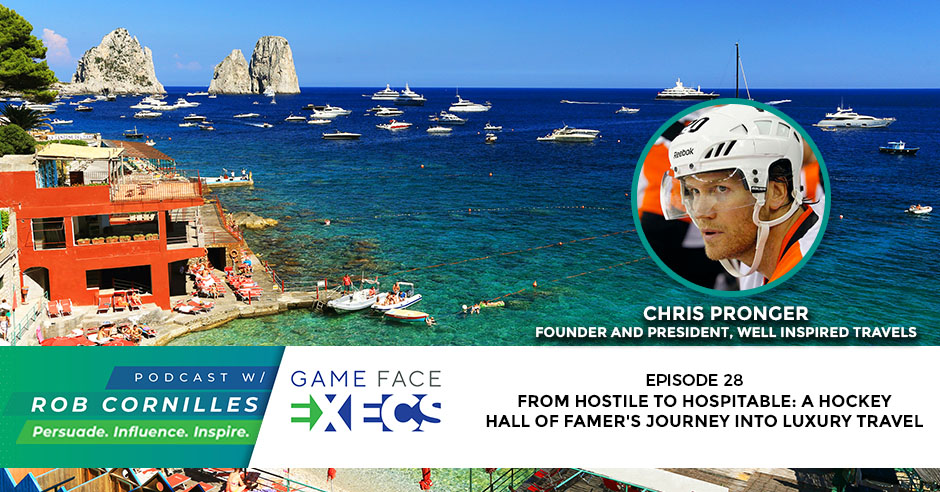
Who could have imagined that a fierce hockey player, who butts heads with opponents would eventually transition into the tranquil world of luxury travel? This is exactly what Hockey Hall of Famer and two-time Olympic Gold Medalist Chris Pronger did when he and his wife founded Well Inspired Travels. He shares with Rob Cornilles how his years as an athlete is now reflected in his life as an entrepreneur, especially when it comes to handling business pressure and maintaining the drive to move forward. Chris also explains the right mindset needed by every leader to motivate teammates, whether on the ice or in the office.
—
Watch the episode here:
Chris Pronger | From Hostile to Hospitable: A Hockey Hall of Famer’s Journey into Luxury Travel
I have got with me some circles, the infamous Chris Pronger, a Hall of Fame Hockey Player. A man who, if you know anything about the game of hockey, you know he is one who has several records to his name. He retired several years ago, but before he retired, he was one of the few people that, not only won the MVP of the National Hockey League, but also the Defenseman of the Year Award in the same year. He was the first man who had done that for almost 30 years, the only other name next to that is Bobby Orr. Chris Pronger is joining us on the show. It’s such a pleasure to have you, Chris.
Thanks for having me. I appreciate it.
Chris, you and I have said that we’re going to have a very all-encompassing interview, but you’ve promised me you’re not going to treat me like one of those locker room reporters, right?
No, I’m going to lay off as long as the questions are good, Rob.
I’ll do my best. Before you and I knew each other, I’ve got to tell you I was a fan of yours and an admirer of your play. You have skills and qualities I could never touch. First of all, you’re 6’6”, you’ve got about a foot on me, Chris, as you know. We’re going to talk about your hockey career and how that positions you for what you’re doing now, but first, let’s fast forward to the present. You and your wife, Lauren, have started a business called Well Inspired Travels. Can you share with my audience a little bit about your business and the genesis of it because it’s such an inspiring story?
It’s my wife’s baby. It stems back to her childhood when she was six, her father was diagnosed with stage four colon cancer. With that, he looked at his wife, my mother-in-law, and said, “I want to see the world for as long as I’m on earth.” They went off to Europe that first summer and my wife got to see him full of life, energy, and happiness, and off the chemo. They went back for school and he started planning the next vacation and went back on chemo and radiation. She got to see him, the shell of himself and a beaten-down man. He fought hard enough for them to get to that next destination, which was Asia.
My wife is a firm believer that he chose to marry Western and Eastern medicine. He would go off for weeks at a time into the jungle with a medicine man, learn about holistic healing methods and transcendental meditation, and immersing himself in Eastern culture and Eastern medicine. With that, they’re off looking at the Great Wall of China and all the different sites in Asia. He’s really at the forefront and ahead of the curve and marrying Western and Eastern medicine. He was able to learn some things that allow him to stave off death and wait for Western medicine to catch up. Fortunately enough for them, they get back and there was a radical new surgery over in Western medicine. We had it two years later, he was given a clean bill of health, was cancer-free, and a medical marvel.
My wife got to see the healing powers of travel and what the mind, body, and spirit can do. That left a mark on her and they continue to travel all through her childhood and then early adulthood. When we got together, I would travel and we would travel together, and I’d be in the middle of training in the summer times. I’d become a little bit unglued when I couldn’t eat the same way as I was when I was training. I was a little maniacal about my training and she looked at me and go, “You get all this money, you get all this stuff going on and you can’t relax.” I’m like, “I’m preparing. This is the way I prepare for the season.”
We would try to source and look into different properties where they would cook the food the way I wanted it cooked. There was either on site or nearby a workout facility I could go to. As we started doing that, my wife started to get calls from other girlfriends, wives, athletes, and asking about how we sourced the property. “Can you set us up?” That was the beginning of learning about our network and what that trust factor can do.
As my career went along, she would continue to get calls from people. When we got to Philly and social media started to take off, she had a little private account and we would post pictures on there and she kept getting other athletes, celebrities, and friends asking her, “How did you find that place? Can you hook me up? Can you set me up?” It started getting 20, 30 people, and I’m like, “There’s something here.” At the same time, we got three young kids at home. I finally get hurt in Philly. Her mother has breast cancer, and her father has a debilitating stroke and is paralyzed on his right side. From a timing perspective, it wasn’t right. We came back here in St. Louis, I got healthy. Her mother is now healthy. Unfortunately, dad passed away a few years ago. Our oldest started driving and we started seeing some light at the end of that tunnel as it relates to the kids and needing a lot of our time as it relates to driving around and getting them around to different events and things like that.
Lauren had a lot of time on her hands and wanted to start this. It was her baby, and I told her I’d help support her on the business side and support in making introductions, networking, and things like that. I started having so much fun. Hospitality is an interesting industry and the fact that people are happy. It’s a very jovial atmosphere. Everybody wants to help one another. I found that intriguing coming from where I came from where everybody’s like this, look secretive, and looking for that hidden gem, etc. I found it appealing and interesting.
I was always the guy that planned the fishing trips with all my buddies, golf trips, Super Bowl pool, Masters pool, all that stuff. I’m an event planner at heart anyways. It was exciting and I was happy. At the same time, I had kicked the tires on a few other companies with a friend of mine because I wanted to run my own business and be my boss. It didn’t work out. It’s funny how timing works out and this presented itself. It was exciting and a passion of mine, a passion of ours and something that we feel we’re lacking in the marketplace. I jumped headfirst into it and haven’t looked back since. It’s been a lot of fun. It’s been a lot of work obviously, but if anybody knows anything about me, hard work is not the issue.

Luxury Travel: Athletes tend to have a certain desire to always perform higher than anybody else.
You don’t become one of the top 100 players in hockey history if you’re averse to hard work. Chris, when you speak about Well Inspired Travels, it’s more for the executive audience rather than for family travel. Is that a fair statement?
It’s both. Our niche clients are athletes, celebrities, CEOs, C-level executives, business owners, high net worth family offices, and the reason for that is that’s what we know. From the standpoint of demands on your time, the stress of the job, pressure on home life, the fame, fortune, all this stuff that when you look at that section, there are many parallels amongst that group. We do leisure travel and some corporate work. It runs the gamut. The more interaction we can have with our clients, the better we’re able to serve them. Whether it’s corporate work rolling into a family, leisure travel or vice versa, we’re able to dig deep and learn more about you and understand who you are, what you want to get out of travel, your likes and dislikes as it relates to your travel.
That’s very important to us because it helps us get a feel for who you are and that allows us to peel back the onion a little bit and understand how we can better serve you. How we can better help you in your personal life and your professional life, whether that’s from a leadership standpoint, the home front. There’s so much going on in the world right now. We feel like we’re in a position to help people through travel but also in their everyday lives as we get to know them. There’s a mentorship side that comes into play with us. As we learn more about you, we can steer you in a direction based on what we know. That’s why it’s important for us to manage a lot of our travels to get to know and have these conversations. Maybe my wife having a 30-minute conversation with somebody’s spouse or myself having a conversation with an athlete.
There are all these different things that can go on behind the scenes that sometimes have nothing to do with travel, but it allows us to get a feel for where you are in your given profession. The different stress points, the areas in travel that can help you the most, whether that’s as simple as learning a new sleep technique for a CEO that’s going to allow him to be a better leader. I knew the holistic healing method for an athlete. That’s going to allow them to recover faster and play at a higher level. We want people to be able to implement those things into their everyday life, both personally and professionally, whether it’s a two-day trip or a two-week trip. We try to dig deep into our client’s lives in a non-obtrusive way and get to know them and become friends with them.
Listening to a former player, such as yourself, you had an eighteen-year career. You retired about ten years ago. It’s interesting and fascinating for those of us who are fans or admires a professional athlete without being, as you said, intrusive to get a peek inside that private life because we know them on the ice. We know them on the field or the court. What are some things that athletes go through that we don’t have visibility to that if we did understand, perhaps we’d appreciate greater what they have to go through to maintain that high level of performance?
There’s a number of factors. I think number one, for me personally, was that internal struggle of pressure, stress that I would put on myself to perform. Let alone the outside world, the fans, management, ownership, and teammates, I had a certain level that I needed to play to and wanted to play to that always was higher than everybody else’s. I expected to be at a certain level every single day, whether it’s practice or games. That internal struggle as we talk about in society now, a little bit more mental health and things like that. Things that are going on at home with your kids, struggles with management, whether you’re negotiating a contract, all of these things have an effect.
[bctt tweet=”I knew it was time for me to retire when I was done learning.” username=””]
It may be a subtle effect here and a subtle effect here, but when you’re making a diamond, it’s not one giant piece of pressure. It’s constant pressure pushing down, creating it. I think having somebody who’s gone through that, that understands the healing powers of travel, the mind-body-spirit, and what that can do to help you let go. Early on in my career, I was like a ball of intensity and passion. I would be a week or two weeks out from a game where I made a mistake and I would still be mad and angry about that mistake. I couldn’t let it go. It drove me bananas and that inner turmoil, people don’t know. They think, “He’s just going to turn a page and he’s going to go to the next game.” Sometimes you’re able to, and sometimes you’re not.
You never understand or know what somebody is thinking about because a lot of times, as an athlete, you’re not going to talk about it. I never talked about it. The media always asked or fans asked, “Who was the toughest player to play against?” I’m like, “Nobody.” I never thought about it in that regard. I didn’t ever want something like that to enter my mind because then I’ve already lost. I think that guy is too good to play against, I can’t play against them. I never would answer that question. I never wanted to say the words because I didn’t want it to creep into my mind. There are all kinds of things like that people don’t understand and don’t get because they haven’t been in those shoes and been in those situations. That’s where our experiences come to the forefront because we’re able to understand people on a much more personal level.
You’re talking about experiences and you’re in the travel business now. It’s my understanding, especially the rising generation are not so much interested in things as much as they are interested in experiences. I had a client and I was attending a conference with them, they are in the travel business. At that conference, it was made very clear among all the speakers and such that experiential travel is the future. It was focusing on international travelers coming to America and what we can do in America to give them more memorable experiences. It was all about the experience. It’s not about sight-seeing. How are you seeing the travel industry evolve since not only you were a participant in it, but now that you’re a practitioner in it? What are you seeing in experiential travel?
When you look at our business, that’s a lot of what we do is creating life experiences, everything. Our company is set up that no two people are alike. No two travelers are alike. What you like is going to be different from what I like. No matter how close we are in ideology, family life, etc., we’re not because no two people are alike. All of our itineraries are different. There’s no cookie-cutter approach here. That’s why the conversations are important is so that you can understand what type of culture somebody is interested in learning about destinations, culinary and adventure. All these things help create those experiences for people so that they are getting to learn, understand, and value more of what their interests are. As we continue to build out our company and build out our business, I think that’s a hallmark of what we do. One of our core values is understanding people and that relationship is vitally important to what we do.
I have to wonder, on the ice, you frankly made some enemies, your teammates. For those reading, who may not follow hockey as religiously as others, he was a dominant force on the ice for nearly two decades. Certainly, that’s what earned him induction into the Hall of Fame in 2015. It’s funny to hear you talk because I’ll bet some of those players that you butted heads with or fists with are probably now really good prospects to be your clients. How do you turn that page mentally?
When you’re playing a game as we do in sport, it’s a physical sport, I can’t tell you how many times whether I’ve met somebody or somebody that I’ve known has talked about meeting somebody that I played with or against. They played a brash style of the game. It’s like, “I didn’t realize that guy. He’s a nice guy.” I’m like, “I realize that.” Some people step on the ice, and then they flip that switch, and it’s war. They’re doing whatever they can to win. People love seeing it, but they don’t understand that most of the time, that’s not who you are off the ice. You have your own life and whatnot, but when you put your skates on and you’re either filling a role, playing the villain most nights, or that’s the way that you play the game. I played the game this way since I was seven years old. That’s the only way I know how to play.
Your older brother taught you that, right?
Yes. I had to keep up and play with the older kids. I had to play the bigger boy hockey. When you’re getting shoved around, you’ve got to learn how to use your stick, leverage, and all that good stuff. When you grow up bigger, all those things play to your advantage.
It’s so ironic, but it’s cool. Now, you’re in the hospitality industry. Who wouldn’t have thought that several years ago that Chris Pronger would be making sure that I’m having an enjoyable evening with my family?
Everybody can turn the page somewhere somehow.
You’re turning the page. You’re showing a different side of your personality that your former career didn’t call for.
When you asked that question about what people probably didn’t know, this would be the other part is as an athlete, you’re on this stage and how often do we see your real personality? You’re answering questions about a game when you’re in this mode. You’re not asked about this, that, or the other thing, it’s this right here. This is the person people are going to see, whether it’s me chirping at somebody in the media, having fun with them or cross-checking somebody in the back in front of the net, or taking a slapshot from the point.
There are all kinds of different things that they’re going to see, but most of them are not going to see me at home with my family or see me at home in my community walking around, going to the coffee shop, going to the grocery store or outside of the barbecue cooking everybody dinner. They’re thinking, “He’s got a chef, he’s got this, or he’s got that.” I don’t know what people think. I don’t think they realize they put athletes up on a pedestal and they think this but, we’re good at a sport and we’re good at what we do. Like everybody else, you always hear the same cliches that I chew my food the same way you do.

Luxury Travel: No matter how close two people are in ideology, they are still two extremely unique individuals.
You’re good at so many things. I want to learn some more things from you and I think my audience would as well. We have many executives who are listeners and viewers of the show, so help us understand a little bit better from your experience. Let’s say, even though you mentioned, you could have gone back and you had a bad moment two weeks ago in a game. Maybe the crowd doesn’t even notice it, or maybe it was the blender that causes a loss, who knows? Either way, you have a bad experience and many athletes say, “It’s just time to move on.”
Coaches say, “Let’s forget about it. Tomorrow is another game.” In business, we have a bad moment, when we have a bad meeting, when we have a client that has surprised us with their disdain for our services or our product, or they tell us that our people are not performing and they don’t want to do business anymore with us. From your athletic experience, Chris, what advice can you give us on the business side to be able to put those incidences aside, or at least learn from them and keep moving forward?
There’s another meeting. There’s another client. I think one of the things that I always try to do, obviously you’re going to fail and you can’t fear failure. It’s going to happen. Hockey business and that’s why when you look at the client list, it’s the same because if you make a mistake in hockey, you better learn from it. If you make a mistake in business, you better learn from it. What mistake did you make? Reverse engineer it and look at what mistake you made, where you made it, how to not make it again, and start moving forward again. It’s a wash, rinse, repeat, that cycle.
[bctt tweet=”I pushed everyone in practice so the games would be easier.” username=””]
I always like to talk to the young players that I played with. As I gained more experience, I’d be like, “Stop trying to make the hard pass all the time. Stop trying to be noticed. Stop trying for everybody in the crowd, on the TV to know that you made that play. Make the simple plate, make sure that nobody knows you played this game. You are going to be fine.” As you gain confidence, as you gain experience, as you gain it, you’re going to then be able to use your talents and be able to gain more and more success. People are going to know, “This guy played ten games. He hasn’t turned the puck over once.” You’re going to gain trust from the leaders, the coach, the CEO, your manager, whoever it is. Start small and then set little goals. Too often, people are like, “I don’t want to do this.” If you set goals, they’ve got to be attainable goals.
You can have a dream and I want to do this, but how are you going to get there? You set these little goals and every time you can track your progress, you’re gaining confidence, motivation and power. With each one of those things as opposed to looking up and going, “I want to be there. That’s far, how am I going to get there?” There are many things that when I look at sports, I look at business, there are many parallels. It’s crazy how businesses operate. As you know, there are good businesses and good sports franchises, and then there are not so good. There’s always a reason and it’s funny, it’s always the same reason.
I want my audience to know. Chris knows what he’s talking about here. Chris played for, let’s see the Hartford Whalers, the St. Louis Blues, the Edmonton Oilers, the Anaheim Ducks, and then wrapped up your career with the Philadelphia Flyers. I would add that with the Flyers, the Oilers, the Duck, those are the last three franchises you played for. Every one of them went to the Stanley Cup because of you.
Along with my teammates but, yes.
You were a captain on those teams. You were assistant captain, as well as the fact that the Ducks won their first Stanley Cup the year that you arrived. Even though the previous year, they were your rival when you played for the Oil. Chris knows what he’s talking about taking an organization from good to great. Something else you said there, Chris, that I want to touch on. It’s interesting as a professional athlete, you get to watch the tape. As a professional executive, there is no such thing as tape. I can’t watch tape of a bad meeting so I had to figure it out through review. I’ve got to figure out what I did wrong. I guess that suggests that I need to talk to the people around me. I need to talk to the people who I work with, my colleagues, even though they report to me, I’ve got to humble myself and maybe ask them, “Did I do something wrong?” Have you found that even when you were captaining teams?
No. I think that’s the leadership side and ownership side, not owning the team but buy-in from everybody. Ownership in what you’re trying to do, whether you’re the CEO or you’re the low-level executive or employee. You need people to want to come together and come every day, passionate about what they do, feel like they’re a part of the team, and feel like they’re a part of something. You’ve also got to push people. It’s funny when you pushed people, a lot of times there’s pushback or there’s hate or angst about odd. “Why is he doing that?” Once you leave and you go to the next team and all of a sudden, their play drops off, they realize, “He was pushing me to be better. He was pushing me to get in the gym. He was pushing me to strive for excellence.”
Whether that’s sports or business, pushing your employees, pushing yourself. I was always harder on myself than I was anybody else. I was always pushing myself in the gym, pushing myself in practice. I pushed everybody in practice because the games would be easier. If I was out there defending you as hard as I could, I guarantee you that games are easier. When we were at our best, we were all practicing at that level, the game was nothing. It’s pushing people to strive for excellence, but incorporating that into the group mentality and we’re stronger together. If everybody’s going in a different direction, the business or the team is going to fall apart.

Luxury Travel: Many people sometimes put athletes up on a pedestal, but in fact, they are just like everybody else.
I think when you say we got to push each other in practice so that the games are better and even easier maybe, in a business setting, it suggests to me that maybe we ought to practice our meetings. Practice our presentations to clients, to each other, and go hard at each other so that when the clients are finally sitting in our conference room, it’s a piece of cake.
I think when you see mock trials when you see defense lawyers and prosecutors do mock trials, they’re doing that for a reason because they want to see what works and what doesn’t work. “What verbiage should I use?” There are all kinds of ways that people can improve on what they’re doing, whether it’s me and my current business now or public speaking, or what have you. There are many different things that you’re constantly looking at to improve on.
I go back again to what I learned when I was playing, I knew it was time for me to retire when I was done learning. If you’re not learning, you’re going back because everybody else is learning and getting better. The same holds true in business, it’s knowledge, its understanding, the client’s understanding. The business you’re in and the competitors and what they’re doing and understanding where you need to be focused. Which part of the business is slacking off? Which part of the business is excelling? Those metrics, I’m not a great analytics guy, but there’s a number of things where when you’re looking at it, you’re like, “That makes sense to me.” Numbers don’t lie, that’s a fact. Numbers are unbeaten when studied correctly.
It’s a great point there. You talked about knowing what your competition is doing. For everyone reading, Chris and I have something in common, maybe there’s one thing other than being friends. That is that every franchise he played for a game phase, have done some work for, and one of those cases, when you, Chris were at the Edmonton Oilers, I think you were only there for one season. Isn’t that correct?
Correct.
You took them to the Stanley Cup finals. Before that, you beat the Anaheim Ducks in the conference finals, right?
Correct.
That was a rough series, as I recall. Edmonton trades you in the offseason to Anaheim. Now you’re going from the Oilers to your nemesis, the Ducks. With the Ducks, you go on the neck next year, again, to win the Stanley Cup finals this time. I have to ask you, what’s that transition like when you’re walking into the locker room or the training facility with those people that were your enemies a few months previous? How do you make that mental switch in your mind because I think in business, sometimes we hold grudges?
Sports are no different. When the trade was made, I didn’t know a lot of players on the team either. There were a couple of guys that I was friendly with. I knew Rob Niedermayer because of the same draft year and things like that but there were hardly any guys that I knew. John Scott, a little bit from All-Star games and things, but went in there cold turkey. Normally, you know somebody pretty well on a team and that one, I didn’t know anybody. I think they knew they had a good team and they knew they were getting close. When I got traded there, they felt like, “Now we’ve got a chance. We’ve got our team.”
[bctt tweet=”The more interaction we can have with our clients, the better we can serve them.” username=””]
That’s what’s great about that team, we gelled right away. We had the mindset and belief that we’re going to win, nothing else. It wasn’t going to be good enough to get to the finals. It wasn’t going to be good enough to win our conference. It wasn’t even good enough to win a playoff round. It was only going to be good enough to win the whole thing. If we didn’t win the whole thing, it was going to be all for not. Everybody in our locker room bought in from day one and we put the work in. We practiced hard and we prepared hard. That was probably one of the funniest teams to play on because we could play a 2-1 tight-checking game. We could play a 6-5 barn burner. We could play a finesse game. We could play a physical game and beat you up.
It like, “Pick your poison. What do you want?” You don’t let the other team decide. The fun part is when you can play all those different styles. We played a heavy, hard game. It fit the way I wanted to play and everything was set up for the players that we had on the team. Everybody that we brought in had a specific role, they knew their role and they played their role to a tee, which is like a business. Understanding your role, doing your job. Can you paint outside the lines? Sure you can, but you need to be focused on your job and then you can do that, and focus on what you do best. These guard rails aren’t here and you can’t go over them. You need to do this first so that everybody else can do their job, and then you can freelance a little.
It’s crazy to me how you can go from one mindset about a certain group of people and then the next day, they’re your teammates. The past is the past. We’re going to win together. I’m reminded, Chris, do you remember Paul Ryan? He used to be the US Speaker of the House. He retired a couple of years ago from Wisconsin. One time he said to me, “Grudges are for rookies.” When it comes to politics, you go hard against your opponents, whether it’s a person you ran against or the other party that you’re running against. Once the election is over, grudges are for rookies. It’s time to get to work. It’s time to find common ground and success together. That’s what athletes such as yourself if that’s such luxurious careers have learned to do. I think in business, sometimes we think, “I could never work for that company. I could never go work for that guy because I’ve heard his reputation.” Athletes don’t have that prerogative. They have to make it work and I find that very admirable.
Every time I was traded or anytime we got somebody in, you immediately have 22 new friends. That’s why it’s harder on the families and the player because they’re coming in and the kids have to make friends and then the wife has to make friends, but you’re coming in and you immediately got 22 new friends. You come in and you start practicing playing. Everybody tries to get to know you a little bit and get immersed in the team. You have dinners, you go out on the road, you go to a movie, you go to dinner, you do this, you do that. You’re immersed more in a group and then it’s seamless. I think that to your point as I played hard against Teemu Selanne. In my old career, I was always matched up against him.
He was always on my side. I used to always pound on him and all that. We always used to battle. I got there and the first day, we got into the room, I looked at him, I go, “What’s up T?” We hugged it out right there in front of everybody like, “Let’s go boys.” There was a bigger issue to deal with and that was to win. It’s a game, and like it’s business, get past it and move on. If you’re holding a grudge, you’re not focused right here. You’re worried about this stuff that you can’t control. I think that’s one of the things that I’ve learned as my career went along, whether it’s worrying about that play or worried about a grudge. His day will come, I’ll get him another time.
We need to focus on winning. Some of the guys I played with would always be like, “If something happened to me on the ice, it would be like a count of five, just wait. It’s coming.” 2 or 3 seconds later, I’d find that guy. As I aged, matured, gained experience, I learned to manage my game better and my emotions better and not hold an immediate grudge, but find a time in due course. Whether it’s, you’ve got to do business with somebody at some point, you’re like, “They’re going to have to come to me.” Why not go to them? Why not be proactive? Why not get past these things? There’s a lot of times you hear what you said, “I’d never do business with that company.” You never know.
I learned a long time ago to never say never because honestly there’s going to be some point in time where you might have to deal with that GM, owner, CEO, or that CFO. You never know. Unless you’re 100 years old and about to die to say never, there’s a lot going on out there in the bigger world than this little area in front of me. The vast space out there, there’s too much going on in the world to say never. I get asked all the time, “Are you never coming back to hockey?” I’m like, “I’m not going to say never, but it would have to be something pretty special because I’m loving what I do and I’m enjoying it. It’s a passion.” I’m not going to say never because I’ve learned my lesson. I said never one time before and it came back to bite me. I’m never going to say it again.

Luxury Travel: Business leaders must inspire people to remain passionate about what they do and feel like they’re part of the team.
You came after your playing days, you worked for the Florida Panthers for a while, that Jersey is on the wall behind me. As a senior advisor, was that something that you were anticipating, you were looking for or were you doing the right things and the right opportunity came along?
I was working with the league in the Department of Player Safety. I had two passions growing up. One, I wanted to run my own business and two was, I wanted to be a GM or a president of a team. At the time, I spent a couple of years after I got hurt to get healthy. As I was at the tail end of my recovery, I got a phone call from Bill Daly, the Deputy Commissioner asking me if I would take on this role in the Department of Player Safety. They had lost Rob Blake, Brian Leetch was done and Brendan Shanahan was going to Toronto. There were a lot of turnovers. They wanted somebody that had recently played, had some stature in the game and would be able to talk to players and do all that.
Once this started coming to fruition, you see one path and whether it was working out or not, this opportunity was too good to pass up. To be able to build a business from scratch and to be working at home with my wife and, and now our staff. It like when I speak to some of the managers and staff that are with the Seattle Kraken and Vegas Golden Knights, being able to build something from scratch and being able to get in from the get-go, you’re able to see from ground zero up. You’re able to learn so much more about how businesses succeed, how businesses struggle and do a lot more research and understanding on how those pieces all interweave together.
[bctt tweet=”You will eventually fail, but you must not fear failure. You just have to learn from it.” username=””]
It’s a lot of work but I like hard work. In my head, I work 24/7. I’m always thinking. When I was playing, at night I’d be watching TV, but I’d be watching clips of a guy that you’re going to play against, whether it’s a game or two later. You’re storing in your head the move that he did on a certain play. You get into that position, you know the move he is going to make. You know when a guy is going to make a play like that. You have seen it already, having the experience and understanding of playing against players, you know when a guy’s going to make that move. It’s no different in business. You understand the competition, you understand clients. You understand where your business is at a certain point in time and where you need to get to and what you need to do to add tangible value to have people want to partake in your services.
Chris, as we begin to wrap up, I want to tap into your player experience, but also see how it’s translated into your experience now as a business owner. When you were on the ice, you would feel so much energy from the crowd. I perceive that but correct me if I’m wrong. That positive or negative energy depending on which it was, you would either ignore it perhaps or you would feed off of it, or maybe you’d feed off both, I don’t know.
I want you to share that with us, especially when we’re in a climate right now because of the pandemic that we know travel has been affected. You could be getting negative influences right now and naysayers saying to you, “Chris, good idea but you and Lauren, you’ve got to think of something else because nobody wants to travel right now. You can’t go any place easily right now.” You’re getting all that negative energy. What did you learn on the ice about that you’re now translating as a business owner?
I was fortunate enough that I got booed in a lot of buildings so I fed off that energy. I fed off that home crowd, energy, and excitement. For us, I don’t worry about the outside world. I don’t worry about what other people are saying. We track what’s going on in the marketplace. We track what’s going on in the hospitality industry. We track what’s going on in the world globally, domestically, and get an understanding of where things are at, especially as it relates to the pandemic. I think as it relates to our business, we’re in it for the long haul. We’re making an investment in our business now and putting resources, training our staff, learning about what’s out there, having a conversation with suppliers, and still sending people on domestic travel and some smaller international stuff. Mexico, Caribbean, things of that nature until things open up more globally.
It’s been pretty good to use this time to test out different functions and things that may or may not work. While we’re in the midst of this pandemic to get a feed and a read on what works, what doesn’t work, what messaging works, what do people think about this product that we want to institute and put into our systems, our processes, our interactions with our clients. There are many things to think about and many things to look at as it relates to our business. It’s given us an opportunity to move a little more slowly, to make sure that everything is in alignment and following the right guidelines, if you will, for our business. When things open back up, as you said, we’re going to hit the ground running and we’ll be able to service all of our clients in the manner that they expect, and we expect to be able to serve them.

Luxury Travel: If you’re holding a grudge, you’re not focused right here. You’re worried about things you can’t control.
You’re getting ready, right?
Yeah. It’s work, but it’s also practice.
To be clear to everyone reading, it’s not like your company is not producing results right now for clients, but the pace probably afforded the opportunity right now to practice and to hone so that when things open up, you hit the ground running. Let us wrap up with three rapid-fire questions. You, athletes, are accustomed to this because reporters are shooting questions at you all the time. You can give me a one-word answer if you want. You can treat me like the Philly Press Corps if you want. We like to talk about things that persuade us, things that influence us, and things that inspire us. In that order, I’m going to ask you, who is the one who has been most persuasive in your life to become what you are today?
I would say, my wife, in guiding me, being supportive, pushing me to be me and not be somebody that people will think you are. Be yourself and be who you are. Too often, people want to play into this persona and that’s when people get into trouble. They think that’s who they are because that’s what people think they are. As I’ve aged and gained more experience, I’m just, “That’s who I was.” Too often you want to say, “That’s LeBron James, a basketball player, Michael Jordan, the basketball player, or Chris Pronger, the hockey player.” No. I’m Chris Pronger and I used to play hockey, but I don’t play anymore. That was my former job. Now, I’m in job 2.0, 3.0, 4.0, whatever it is. From a persuasive standpoint, I think being comfortable in your skin and being who you are.
The next word is influence. How do Well Inspired Travels influence the travel industry?
With our business model and how we want to interact with our clients, it’s a game-changer for those that want that type of service, that type of interaction, and understanding of who they are, who they want to be, and how they want to get there. For us, it’s understanding the why and that’s why the questioning. That’s why the peeling back the onion, understand who you are and what you’re about. Where do you want to get to? Often like my journey, it can be erratic. A few people continue on that path. There’s going to be a few zigzags along the way.
Lastly, in your hockey career as well as your business career, in either one of those or both of those, who has inspired you? I think by the way, on the hockey side, one time you told me about a particular player who also ended up in the top 100 players of all time. You said may have been your greatest inspiration, but I don’t want to give it away.
It’s funny how things come full circle, especially in the sports industry. When I was growing up as a youngster, my favorite player was Mike Bossy, then my favorite player was Wayne Gretzky. It’s funny how one team won four cups in a row and the next won four in five years then I didn’t have a favorite player, but I enjoyed watching Ray Bourque. I enjoyed watching Al MacInnis. It’s funny how everything comes full circle. I got a chance to be with them all at the top 100 induction in LA at the All-Star game in 2017. I had a great conversation with Mike Bossy and told him about it, had 30 minutes chuckle, and got to know him a little bit more personal. Those are the types of conversations you love to have and talk to players, watching him go down the wing and let a slapshot go over or a little quick slapshot. It was impressive. There’s a reason he scored 50 goals in 11 straight years.
Chris, this has been a really helpful conversation. It’s obviously fascinating to talk to someone of your stature and your background. We wish you the best along with Lauren in continuing to grow Well Inspired Travels. I would encourage my audience to look into it, for your company, for your executive team, for your family, or for yourself. There’s so much that Chris and his staff provide and it’s a service that we need, and sometimes we don’t even know we need it until we’ve experienced it.
That’s exactly the tagline right there. That’s why you do what you do, Rob.
[bctt tweet=”If you’re not learning, you’re going backwards because everybody else is learning and getting better.” username=””]
It’s been great. I wish you the best. Please say hello to Lauren for us and your staff. Keep doing well out there in the travel industry.
I appreciate it.
—
This sense of control is something Chris learned over a hard thought career. Though the unwinding pressure from all sides to perform at the highest level, as he describes it, could have been easily overtaken him. That’s why Chris and his wife, Lauren are so passionate about Well Inspired Travels. Their family-owned luxury travel business for athletes, entertainers, CEOs, companies, and families. Hear the inspiring stories of what prompted their new business and how his lessons in professional sports informed their business decisions. Join Chris and me for the rest of the conversation on YouTube or your favorite podcast platform for what promises to be a front-row seat into the mind and life of one of the 100 greatest NHL players of all time.
Important Links:
- Chris Pronger – LinkedIn
- Well Inspired Travels
- YouTube – Game Face Execs Podcast
About Chris Pronger
 As a professional athlete with twenty years in the NHL, I’ve heard and seen it all. But, I didn’t start my career in luxe gyms and training facilities – I grew up in a small town in Canada where I groomed my hockey skills with countless road hockey games. These games grew with intensity and when I wasn’t playing the game, I was weightlifting or biking at my local rec center.
As a professional athlete with twenty years in the NHL, I’ve heard and seen it all. But, I didn’t start my career in luxe gyms and training facilities – I grew up in a small town in Canada where I groomed my hockey skills with countless road hockey games. These games grew with intensity and when I wasn’t playing the game, I was weightlifting or biking at my local rec center.
Toughened by street hockey, I was able to make the jump to the NHL, where I’d be introduced to proper nutrition and training during my second year with the St. Louis Blues. After four years of living the life of a professional athlete, I was committed to eating properly and training with a purpose. My game took off, and this new way of life paired with my natural abilities helped me secure a spot as a finalist for the Norris Trophy (Top Defenseman). Eating, sleeping, and training with a strong ideology helped me to achieve the honor of winning the Hart Trophy (MVP) and Norris Trophy in the same year. This achievement had not been seen since the great Bobby Orr did it in 1972, and it hasn’t been done since.
Playing the way that I did took a toll on my body, so it was important to me to stay on top of the latest health and wellness offerings. From ART (active release techniques), specialized nutrition, and making time to recharge my batteries at health-conscious resorts, I’ve always studied and implemented the best practices available into my lifestyle.
I’ve played hockey in four Winter Olympics: Nagano, Japan, Salt Lake, Utah, Torino, Italy, Vancouver, British Columbia; I’ve had the honor to train alongside athletes at the very top of their careers. Olympic athletes use state-of-the-art equipment, train endlessly, and treat their bodies with the utmost care. Watching these athletes, learning from them, and living these experiences were essential to my health and fitness education. The Olympics introduced me to a whole new level of dedication and commitment to the game and to health.
But, it hasn’t been all glamorous traveling and time on the ice. I’ve had fourteen surgeries during my career and countless concussions, sprains, and strains. Hockey is tough on your body, and as a hard-hitting defenseman, intense physicality isn’t optional. I lived by the saying “mind over matter,” which kept me on the ice for so long – until a freak accidental high stick caught me in the eye and I was forced to quit. Recovery from an unplanned accident that ended my career was tough on my body and even more so on my mind. It wasn’t easy to walk away, in fact, I tried to make a comeback. But, I strongly believe that the body knows when the time is up, so with an incredible support system I made the decision to officially leave the game as a player.
The damage of my final injury took a toll on my overall health, and I had beefed up more than I would have liked. Battling blurred vision and fuzzy feeling in my head, I returned to nutrition and fitness to heal. To recharge, I searched for special destinations featuring fitness centers, clean menus, and an emphasis on health. It’s my belief that nurturing a healthy lifestyle is how I was able to overcome the depths of concussions and injuries I endured.
My passion for travel sparked during my career as a professional athlete. I loved being able to see different cities constantly and made sure to try something new during each visit. Stepping outside of your comfort zone and immersing yourself in a whole new culture or community helps you to continually grow. In my current job with the Florida Panthers, I make it a conscious decision to stay at hotels that have fitness centers or are close to gyms so that I am able to continue living my best life! While I’m on the road, I pack healthy snacks that keep me satiated and fuel my body with what it needs. I believe that a healthy lifestyle can be achieved by anyone who’s willing to commit to it and I’m inspired by our ability to share our stories with one another.
– Chris Pronger

